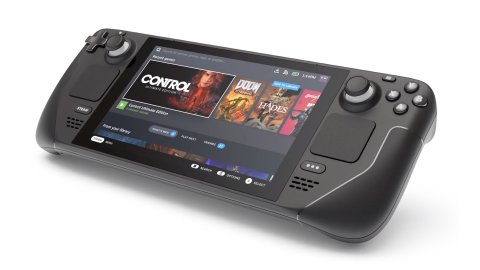
Steam Deck will not have exclusives
Steam Deck will not have exclusives: it is a PC and must work as such, as stated by Valve in the official FAQ dedicated to the interesting handheld.Postponed to 2022, Steam Deck will therefore not offer exclusive content, limiting itself to run the titles available in the extensive Steam catalog, just like a normal PC.
The FAQ asks the question: "Valve is interested in offering exclusive titles on Steam Deck?" And the answer, as mentioned, is dry and clear: "No, it wouldn't make much sense to us. It's a PC and it must be possible to play just like on a PC."
We are not talking about a device with of features such as to be able to lend themselves to the logic of exclusives, as happens for example with VR viewers, which clearly require specific software.
If you want to learn more about the handheld produced by Valve, we suggest ours special on five doubts and five things that excite us about Steam Deck.
Source Have you noticed any errors?
Valve puts up official developer FAQ for the Steam Deck
With the Steamworks Virtual Conference: Steam Deck over now, Valve has put up their own official set of answers to various common questions.
Plenty of it we've already covered and explained in previous articles like native versus Proton, and expanded details on what we learned from the conference. Still, it's always good to have a few reminders for people that missed it.
Here's some of the highlights:
Will SteamOS have a read-only immutable OS file system?
Yes. By default the OS updates will be distributed as a whole OS image. But any user can enter a developer mode, which will let them modify the file system and install packages like a normal distribution.
Do you plan to release SteamOS as a standalone, general-purpose operating system?
We definitely plan on releasing SteamOS as a separate operating system. We don't have exact timing on that. We're really focused on making sure that Steam Deck is a great experience, and we'll release it for other hardware soon.
Will AMD FSR be incorporated into Steam Deck?
FSR is already available for some applications that support it. Games that already include FSR will work as is, but also FSR support will be included as part of an OS future release. Once that happens, games could potentially make use of FSR even if the games themselves don't natively support it.
Would Valve prefer for games to use Proton or to have native Linux support?
Valve has no strong preference. It comes down to whatever's the best experience. So if it's easier for a developer to achieve the best experience through Proton, we think that's great. If a developer has the understanding and the resources to deliver a native Linux build that provides a great experience and has all the expected functionality, and they are able to maintain it, then we think that's even better.
Would Valve be interested in having any Steam Deck exclusive titles?
No, that doesn't make much sense to us. It's a PC and it should just play games like a PC.
You mentioned that you're talking with Unity and Epic, are you also talking to Godot?
Yes, we're talking to Godot as well and are actively supporting them and want their engine to work well with Steam Deck.
Will there be a way to install external apps on deck without going into dev mode?
Yes. You'll be able to install external apps via Flatpak or other software without going into developer mode.
Expanding on the file-system / operating system details, Valve developer Pierre-Loup Griffais was asked on Twitter about it being read-only with Steam and other software on a different partition to which Griffais responded:
'By default, yes, and you get updates via new images for the read-only partition after a quick reboot. You can easily go read-write with a single command and start using pacman. You can stay like that or re-apply an image and start over with a clean rootfs.'
Article taken from GamingOnLinux.com.